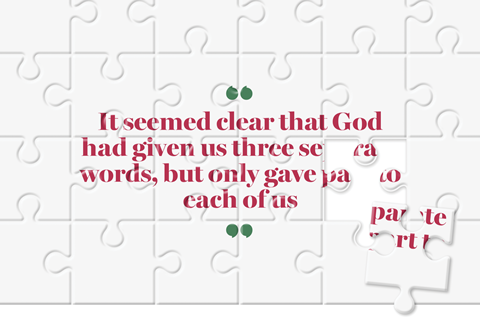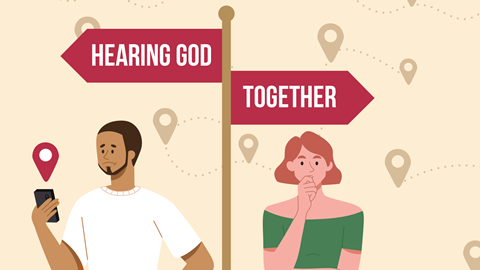Iain Dunbar looks at the tricky subject of decision-making in marriage. Here’s how couples can get better at hearing God’s voice together
Our God is a prolific communicator, always willing to speak to us – especially when we are looking to him for guidance. He has ingenious methods for attracting our attention; he can point us in a particular direction, order our circumstances, provide inspired input through conversation, make biblical texts jump off the page, cause song lyrics to resonate, give us dreams or a sense of either unease or shalom (peace) in our spirit.
The issue is not that he doesn’t speak, it’s that we’re not experienced enough at listening.
For Christians, there should be no such thing as a solo decision. Everything of consequence ought to be by consensus (willing agreement with him). When there are two people trying to come to agreement with God, it gets even more interesting. If the other person is a spouse, the Bible says clearly that you and they “become one flesh” (Genesis 2:24; Mark 10:6-9). So, it is vital that we seek him together on all the major issues of life.
For more than 40 years, my wife and I have tried not to make any major decision without consensus between us and with God – children, houses, career changes, church life, politics, home improvements, plus a host of more mundane things. It’s been a challenge, with notable triumphs and regrettable failures, and I still wonder why there’s so little guidance on joint decision-making in Christian literature.
Listing some of the solutions we’ve come to – and even giving biblical examples, illustrating the principles in each case – may not be practical enough. What might help more is the record of an actual process – what the parties were thinking, the uncertainties, clues and partial revelations; the discussions, the pathway to understanding, the sudden (or gradual) revealing of a solution and the search for shalom.
Martin and Josie’s story
So, here’s exactly what happened recently to Martin and Josie (names changed), who have fewer years of marriage under their belt but whose habit is to pray and seek God’s guidance, individually and together.
Despite – by their own admission - not having a great history of hearing God together, when a crisis hit, Martin and Josie were determined to be open to God’s word. And it turned out that God had some awesomeness up his sleeve.
“The company my husband works for announced sweeping job cuts out of the blue,” Josie explains. “All staff roles were at risk; one in five were likely to find themselves out of work within six weeks. My husband needed to let them know at the beginning of the following week if he wanted to apply for voluntary redundancy.
The issue is not that God doesn’t speak, it’s that we’re not experienced enough at listening
“We both wondered whether this was ‘the moment’, albeit for something we couldn’t quite put our finger on. And we both felt we wanted to hear how God was leading rather than let the process play out. So, for the first time in our married life, we agreed a deadline for some kind of answer. We would pray individually over the weekend, then compare notes on Sunday evening and see if we felt confident God was leading in a particular way. I don’t think I was alone in wondering whether the plan would work!”
Josie continues: “On Saturday morning, my husband went downstairs for his quiet time, and I began my conversation with God: ‘So, how’s this going to work, then? Are you going to speak through my Bible readings, or perhaps through a song? Shall I ask you a specific question?’ I sensed the need to focus. ‘If you say “Go”, I’ll know you’re saying to apply for redundancy. If you say “Stay”, we won’t do anything for the time being.’ I thought maybe it would come up clearly in my Bible readings, or a message from someone, or that I would just have a strong impression either way.
“So, I prayed and read my Bible. I sensed nothing, really, apart from one verse from Jeremiah that felt like God confirming he did want to show us the way (but it didn’t actually say what that way was). I wrote it down anyway.
“My husband came upstairs. He’d had a good time praying. He was now sure that God had opinions about the outcome, but so far was none the wiser about what they were. He’d felt he should read Micah, so had read it through but wasn’t sure if God was highlighting anything particular. Except maybe Micah 2:13: ‘The One who breaks open the way will go up before them; they will break through the gate and go out. Their King will pass through before them, the Lord at their head.’
“I didn’t say anything out loud, but to the Lord I said: ‘Hmm, it does say Go twice, so maybe that confirms my sense, but I’m not sure. I think I need more than that.’”
During this process, Martin and Josie weren’t using their analytical skills, they were trying to work with their sensing and feeling faculties: the conscience for discerning right and wrong; the human heart where our values, desires and convictions lie; the human spirit for picking up invisible spiritual dynamics like ‘ease’ or ‘unease’; and the work of the Holy Spirit. Each is distinct from the others.
Josie continues: “On Sunday morning, my husband went downstairs early again. This time I asked God what he was praying for down there. I had the impression he was thinking about Peter and was asking God, like Peter had done, whether he should get out of the boat, or not.
“I felt God start to speak to me about that passage. Not with an ‘I’m telling you to get out of the boat’ kind of clarity, but drawing it to my attention, pointing out things in the story, and highlighting connections to other passages of scripture, including Psalm 139:9-10: ‘If I settle on the far side of the sea, even there your hand will guide me’, and Isaiah 43:1-2: ‘Do not fear, for I have redeemed you; I have summoned you by name; you are mine. When you pass through the waters, I will be with you.’
“My husband came upstairs and said he’d asked God to confirm something but wasn’t going to tell me what – in case confirmation was supposed to come through me. By breakfast time, I felt there was some significance in the Hillsong song ‘Oceans’: ‘And I will call upon your name / And keep my eyes above the waves / Let me walk upon the waters / Wherever you would call me.’
Talking to God together builds relationship, both vertically and horizontally
“I decided to play it in the car on the way to church and see if God spoke to me while I listened. I figured if my husband was asking God whether to get out of the boat, he could speak to him about it too. I had quite a strong sense of the Holy Spirit as we listened, surreptitiously wiping tears from my face so as not to tip my hand too early about the conversation God and I were having. My husband said nothing, and I deliberately didn’t look at him. We carried on with the day.
“I was out with the children during the talk at church but, afterwards, my husband said he’d resonated with the sermon from Joshua 3, where the Israelites were preparing to cross the Jordan. He felt Joshua’s comment to follow the ark: “then you will know which way to go, since you have never been this way before” (v4, emphasis added) was significant.”
Coming together
So far, God had spoken to Josie and Martin separately. We know what was happening with Josie because we’re reading her testimony, but we don’t know much of what Martin was thinking and sensing and, crucially, they were both keeping their cards close to their chest. It would be up to God to merge two stories into a single, coherent narrative.
Josie picks up the story again: “We got through the kids’ bedtime and sat down to compare notes. Martin went first. He was a bit discouraged; he felt there’d been no obvious confirmation, except perhaps when I’d played ‘Oceans’ in the car earlier on. He had been praying about Peter getting out of the boat and then listening for someone to mention Peter, but no one had. However, he’d felt the Holy Spirit while listening to that song. A few lines had caught his attention: ‘Spirit lead me where my trust is without borders / Let me walk upon the waters / Wherever you would call me.’
“I laughed and explained that I’d played it on purpose - God had told me about Peter and the boat and pointed me to that song.
“He then told me again about how he’d resonated with Joshua 3:4 and Micah 2:13. This time, as he talked, I remembered the first scripture I’d felt God highlight to me that weekend – Jeremiah 6:16: “Thus says the Lord: ‘Stand by the roads, and look, and ask for the ancient paths, where the good way is; and walk in it, and find rest for your souls’ (ESV).
“I’d discounted it because I thought God was just saying: ‘find the good way’, which was fine, but at the time didn’t feel like it related to where he was leading. But now, together with Joshua 3:4, the significance was that this was a new road, one we hadn’t been down before.
“I felt quite encouraged, because it seemed God was speaking about getting out of the boat and travelling on a new way. Also, because we’d both had a sense of those two things, I would feel reasonably confident about pursuing voluntary redundancy. He concurred.
“I added that my focus had been for God to say ‘Go’ or ‘Stay’ but I hadn’t really had any confirmation. Except, just as I had confirmed his word about Peter, maybe he had confirmed mine – Micah 2:13 was about breaking through the gate and going out.
“‘Ohhhh!’ he laughed, explaining that earlier in the day he’d had a few minutes to himself and, instead of putting on his audiobook (which would be his usual habit) he’d decided to listen to music, but hadn’t been sure why. ‘I’ll play you the song that came on,’ he added.
“To me this was God’s sense of humour and his great kindness, all wrapped up together, and it made me cry. The song was ‘Go’ by Public Service Broadcasting. It’s the audio from the Apollo 11 space launch sequence set to music: ‘Retro? Go; Fido? Go; Guidance? Go; Control? Go; Telcom? GO; GNC? Go; EECOM? Go; Surgeon? Go.’
“If I’d felt there was wriggle room before that song, I didn’t feel it afterwards. It seemed clear that God had given us three separate words, but only gave part to each of us so it wouldn’t fully make sense until we put it all together.”

Putting the puzzle together
We can never predict how God will do something – he is so clever! – but what other lessons can we also learn from Josie and Martin’s story?
We should certainly be encouraged that two-way communication with him is possible for all believers, even the least experienced of us. Furthermore, talking to him together builds relationship, both vertically and horizontally.
In addition, two key ingredients should always feature when we seek to include God in our decision-making: we need to hear from him, to support or redirect our analysis; and we should expect to sense his shalom peace, which is evidence of agreement.
A few months after the events detailed above, Josie was reflecting on the sensing and feeling process that she and Martin had experienced. She noted that the guidance they had received individually seemed fragmentary and incomplete at times: “There is a temptation to think God hasn’t spoken because it didn’t immediately seem relevant or fully formed, but I have learned that it’s worth picking up on impressions and senses, being careful to weigh them and ask God to shed more light to see if there’s significance to them.”
Teamwork
When God created both man and woman “in his own image” (Gensis 1:27), his reasoning was that it was “not good for [Adam] to be alone” (Genesis 2:18). He knew Adam lacked certain essential characteristics and so he created Eve as “a helper fit for [or corresponding to] him” (Genesis 2:18, ESV). This was the way God determined to provide completeness and it achieved three essential goals: firstly, it provided the companionship of an equal; secondly, it created the means of procreation that requires the participation of both genders and thirdly, it introduced complementarity.
Being ‘complementary’ means that as well as both parties having strengths, both also have limitations, and my limitedness means that I have need of you. Herein lies a key to the proper operation of the body of Christ, which God intended Christian marriage to be a foundational component of. The man and his wife are a team of two, transformed into “one flesh” (Genesis 2:24). Though different from each other, neither member is more valuable than the other. Their oneness means both sets of capabilities are required if the team is to learn how to make right decisions together.
Can joint decision making also work in a church context? Read the follow up article now at premierchristianity.com/churchdecisions



































No comments yet